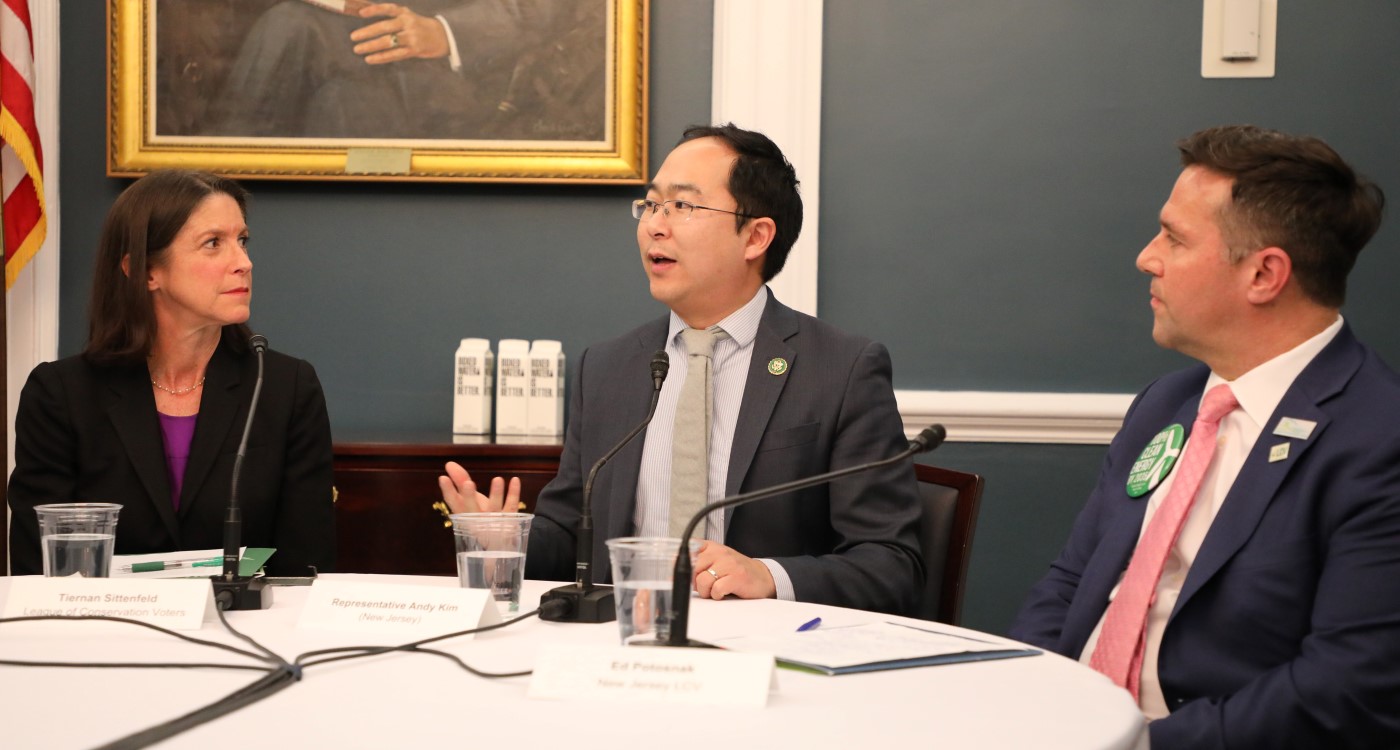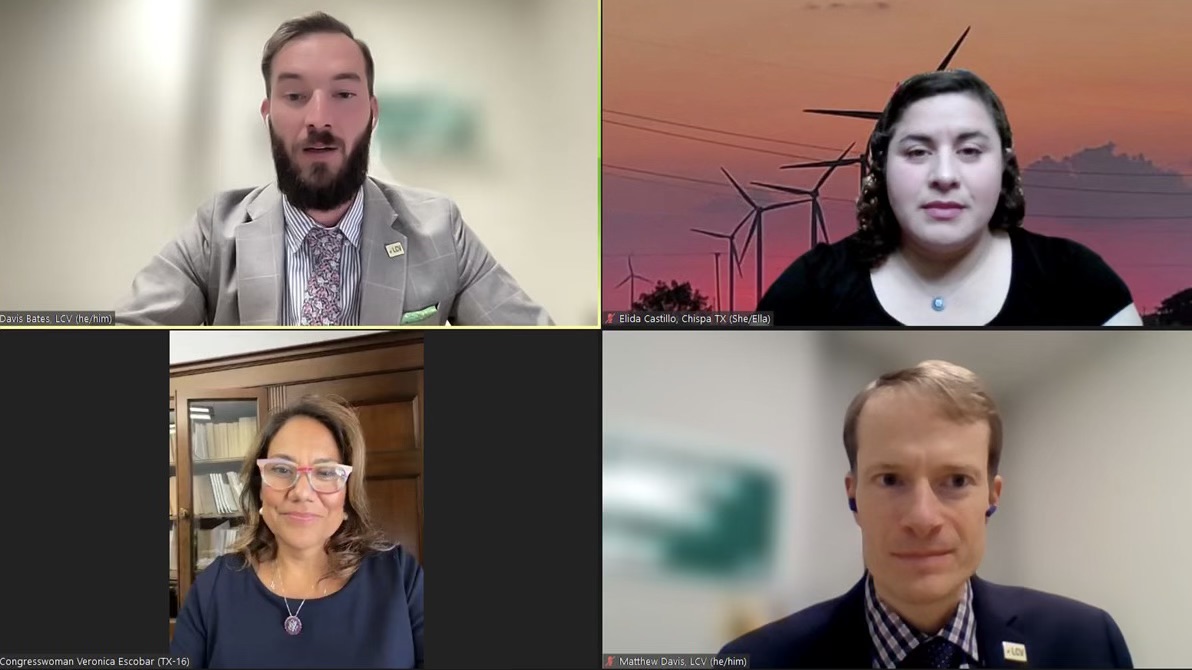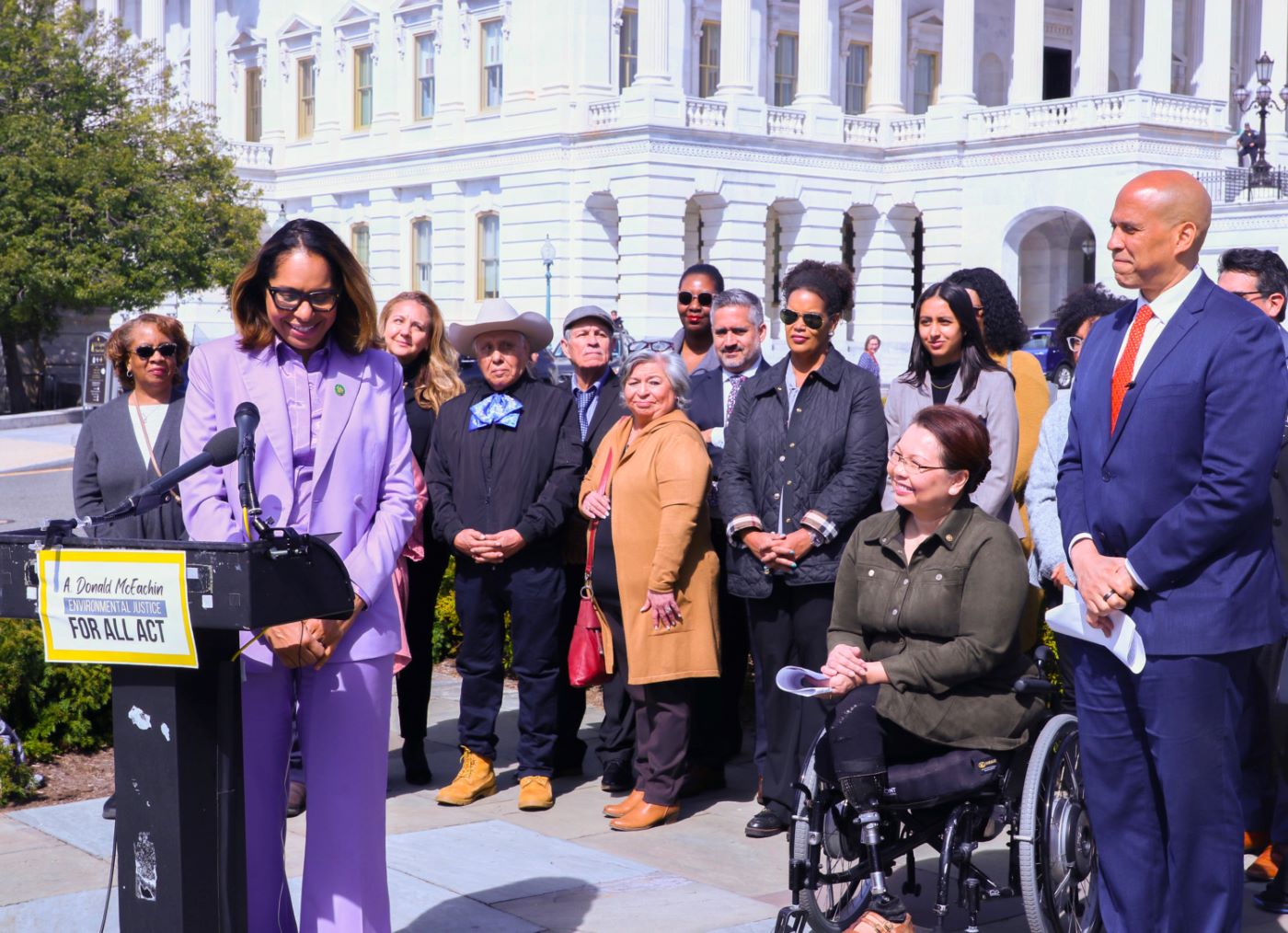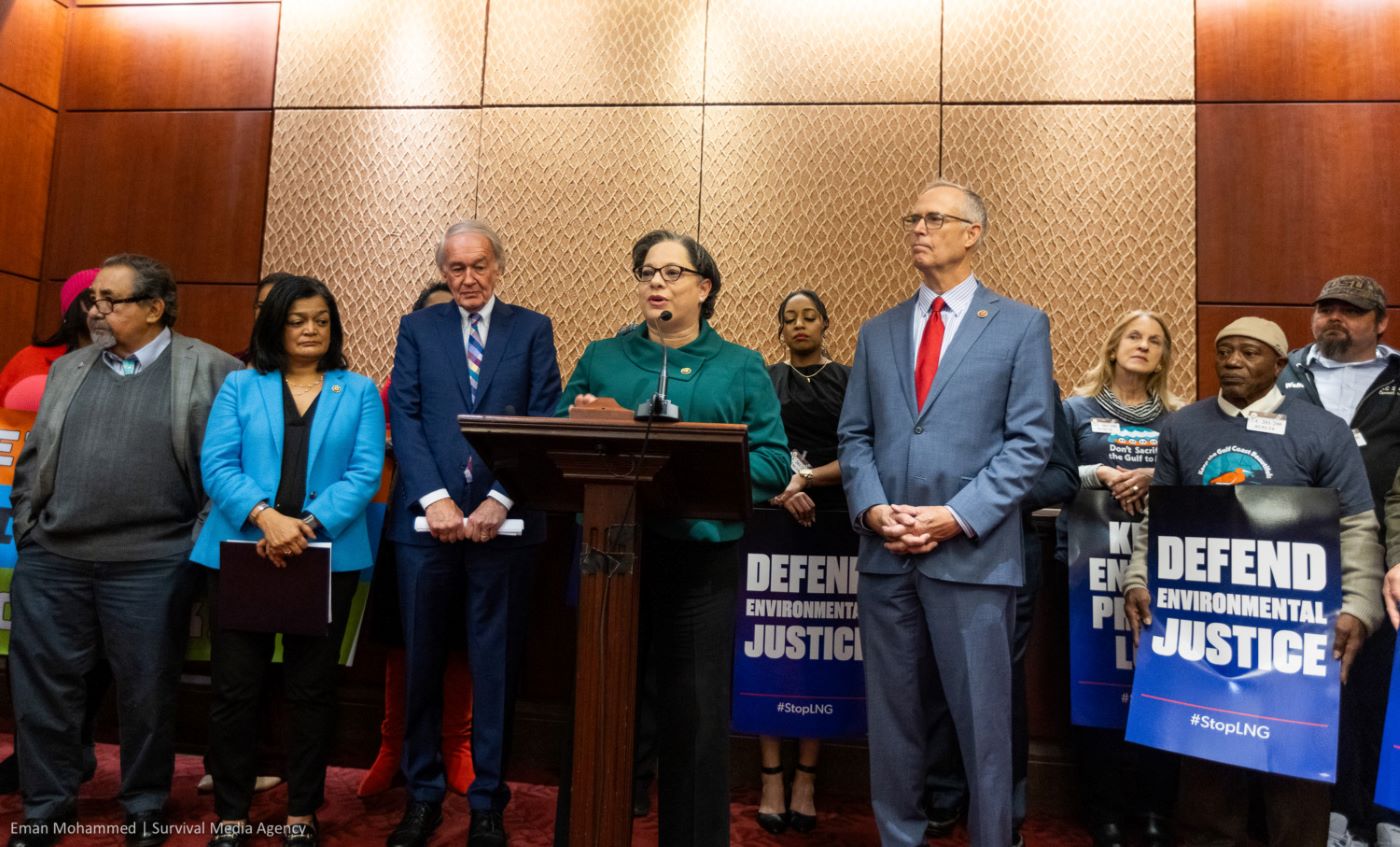Table of Contents:
 Ranking Member Grijalva, Interior Secretary Haaland, and President Biden with Tribal leaders at the National Monument Designation of Baaj Nwaavjo I'tah Kukveni - Ancestral Footprints of the Grand Canyon
Ranking Member Grijalva, Interior Secretary Haaland, and President Biden with Tribal leaders at the National Monument Designation of Baaj Nwaavjo I'tah Kukveni - Ancestral Footprints of the Grand Canyon
The 2023 National Environmental Scorecard demonstrates clear contrasts between the House and Senate. However, climate and democracy champions in both chambers defended critical clean energy investments in our communities and advanced solutions for climate and environmental justice. Many of 2023’s climate, conservation, environmental justice, and equitable democracy bills and initiatives were led and supported by members of the Congressional Asian Pacific American Caucus (CAPAC), the Congressional Black Caucus (CBC), and the Congressional Hispanic Caucus (CHC), collectively referred to as the Tri-Caucus.
The election of Representative Hakeem Jeffries (NY-08) as House Democratic leader made history, as he is the first member of the Tri-Caucus to be elected to lead a party in either chamber. Leader Jeffries has broken barriers and advanced representation of the Tri-Caucus members in congressional leadership. During his first year in the role, he successfully defended investments for our communities and our climate from House Republicans’ relentless attacks. He has consistently prioritized the health of our communities, protecting clean air and water, creating clean energy jobs, expanding voting rights and equitable access to our democracy, advancing environmental justice, and combating the climate crisis.
Leadership on Legislation
Black, Latinx, and Asian American, Native Hawaiian and Pacific Islander (AANHPI) members of the Tri-Caucus – in addition to their Indigenous and other colleagues of color – continued to be a trailblazing force for pro-environment legislation in the first session of the 118th Congress. Below are highlights of that leadership in action.
Equitable Implementation of the Affordable Clean Energy Plan
In 2022, Congress passed the historic Inflation Reduction Act (IRA) and the Infrastructure Investment and Jobs Act (IIJA) – collectively the biggest action to tackle the climate crisis in U.S. history. This year, many climate champions in Congress focused on educating constituents and connecting communities to the transformational investments within this affordable clean energy plan, often working directly with LCV and our state affiliates. Many of the Tri-Caucus members led the charge to ensure these historic investments are rapidly and equitably reaching the communities that need them the most.
Representative Andy Kim (NJ-03) was a key leader who ensured the passage of the historic clean energy and climate justice investments in the 117th Congress and worked to implement them swiftly and equitably. He tirelessly advocated for creating domestic clean energy jobs that promote U.S. energy independence by breaking our reliance on foreign adversarial dictators. Kim has also been a leader on implementation, headlining an open forum with LCV and our state affiliate, New Jersey LCV, to discuss how the IRA’s transformational investments are unlocking, accelerating, and expanding progress. The forum also highlighted the strategies, challenges, and opportunities state and local leaders face as they prioritize these investments and pass major new state policies like 100% clean electricity to build on the tremendous success of the 117th Congress.
 Rep. Kim with LCV and NJLCV during an IRA Implementation Roundtable on Capitol Hill.
Rep. Kim with LCV and NJLCV during an IRA Implementation Roundtable on Capitol Hill.
Representative Veronica Escobar (TX-16) connected her constituents with resources following the reintroduction of her Climate Adaptation Plan Act of 2023 and release of the Climate Crisis Advisory Committee Framework. Escobar held a virtual town hall with LCV, engaging directly with Tribal and local government officials to discuss these historic clean energy and climate justice investments and how to access those beneficial programs. At the event, Chispa TX highlighted the critical importance of prioritizing low-wealth, rural, Tribal, and communities of color when implementing these investments. Chispa TX also emphasized how prioritizing these communities will help meet the president’s Justice40 goals while rolling back decades of environmental racism facing communities living along the fenceline of polluting facilities.
 Rep. Escobar leading a townhall for local officials and Tribal leaders with LCV and Chispa Texas on the affordable clean energy plan.
Rep. Escobar leading a townhall for local officials and Tribal leaders with LCV and Chispa Texas on the affordable clean energy plan.
Representative Sydney Kamlager-Dove (CA-37), a first-term champion, heralded the one year anniversary of this historic law by hosting a town hall and panel to highlight some of its great benefits and discussing equitable access to these programs.
Representative Emilia Sykes (OH-13), another first-term leader, also worked tirelessly to connect the climate and environmental justice investments with her constituents and communities in Northeast Ohio. A proactive communicator and leader on implementation, Sykes hosted many events, including a tele-town hall featuring LCV and our state affiliate Ohio Environmental Council. The tele-town hall highlighted opportunities to expand clean energy affordability, support working families’ bottom line via Sykes’ child tax credit bill, meet the goals of the president’s Justice40 Initiative, and create thousands of good-paying union jobs while accelerating the just transition to clean energy.
Clean Transportation
When it comes to tackling climate change and air pollution, it is essential to reduce emissions from cars, buses, and trucks. The shift to zero tailpipe pollution vehicles is well underway, despite relentless attacks from the oil and gas billionaires who have been fleecing families fueling up for decades.
Senator Alex Padilla (CA) relentlessly championed clean air protections for our communities, leading multiple letters urging the Biden-Harris administration to accelerate the transition to zero emissions cars, SUVs, and heavy trucks.
Padilla also joined Senator Cory Booker (NJ) and Representative Nannette Barragán (CA-44) to introduce the EVs for All Act, a bill that would increase access to electric vehicles (EVs) for residents of public housing across the nation. Many individuals and families living in public housing currently face limited or no access to EVs and chargers, while also grappling with high gas prices and disproportionate exposure to pollution from fossil fueled vehicles. Expanding access to EVs and ensuring the strongest possible vehicle emissions standards are critical elements of protecting public health and protecting clean air for our communities – especially low-income communities and communities of color.
Representative Doris Matsui (CA-07) also continued her longstanding and tireless leadership alongside Representative Yvette Clarke (NY-09) to defend clean air for our communities. Both sent letters urging the Biden-Harris administration to set strong, equitable clean vehicles standards. They also both went to the House floor and spoke out against the dangerous polluter-backed H.R. 4468, which would block the Environmental Protection Agency (EPA) from setting cleaner vehicle standards.
Environmental Justice
Pursuing environmental justice means advancing the equitable treatment and meaningful involvement of all people regardless of race, color, national origin or income in respect to protection from environmental hazards, ensuring access to a healthy environment, decisions impacting their communities, as well as the redress of historic harms. In the three decades since the term became widely known, progress has been made in many communities and at the state and federal level, and much more progress is needed.
House Natural Resources Committee Ranking Member Raúl Grijalva (AZ-07) continued his leadership role alongside Senators Cory Booker (NJ) and Tammy Duckworth (IL) and Representative Barbara Lee (CA-12), advancing climate and racial justice by once again sponsoring the A. Donald McEachin Environmental Justice for All Act. This historic community-led initiative is the most comprehensive environmental justice legislation in U.S. history. Representative Kamlager-Dove joined the re-introduction press conference and has stepped up into a leadership role as an environmental justice champion advancing this critical legislation.
 Rep. Kamlager-Dove and Sens. Duckworth and Booker at the reintroduction of the A. Donald McEachin Environmental Justice for All Act.
Rep. Kamlager-Dove and Sens. Duckworth and Booker at the reintroduction of the A. Donald McEachin Environmental Justice for All Act.
Representative Jennifer McClellan (VA-04) joined as an original cosponsor of this landmark bill and became a strong advocate for environmental justice in the U.S. House of Representatives. Stepping up to honor the legacy of her predecessor, Representative A. Donald McEachin, after his tragic passing, McClellan spearheaded initiatives to combat air and water pollution and protect public health. McClellan led bicameral letters urging the Environmental Protection Agency (EPA) to both comprehensively address per- and polyfluoroalkyl substances (PFAS) pollution threatening clean water and swiftly finalize a protective Mercury and Air Toxics Standards (MATS) rule to limit harmful air pollution from coal-fired power plants. She also joined with frontline leaders as a vocal advocate and ally to fight the dangerous Mountain Valley Pipeline, which threatens communities in Virginia and across the mid-Appalachian region.
Representative Lisa Blunt Rochester (DE-AL) joined McClellan in introducing the Technology Assessment for Air Quality Management Act, which would expand the EPA’s air quality monitoring capabilities. This expansion would serve as a critical foundation for reducing exposure to toxic air pollution, improving public health for at-risk, low-wealth, and communities of color, and advancing environmental justice. Improved air monitoring is particularly important for communities that are more likely to live and work on the fencelines of polluting facilities, freight hubs, and near heavily trafficked roads.
Democracy & Voting Rights
A truly representative democracy — one where all voices are heard and where decisions are made through a fair and transparent process — is essential for protecting our planet for future generations. To address the climate crisis, voters must be able to have their voices heard at the ballot box, to freely and fairly elect leaders, and to rely on fair courts to protect their rights. Who can vote, how easy it is to register, and the number of local polling places are all examples of policies that decide whether or not people can truly have a say in their democracy.
Representative Terri Sewell (AL-07) continued her tireless leadership advocating for a more just and equitable democracy, despite House Republicans blocking any attempt to advance voting rights, by re-introducing the John R. Lewis Voting Rights Advancement Act on National Voter Registration Day. Honoring the legacy of one of the greatest voting rights advocates in Congress and our country, this legislation would protect the right to vote and safeguard our democracy by restoring and modernizing the full protections of the Voting Rights Act of 1965.
Representative Hank Johnson (GA-04) also continued his efforts to advance a fair and equitable judiciary, reintroducing the Judiciary Act to expand the U.S. Supreme Court. This historic legislation would bring balance to the nation’s highest court, help to restore America’s faith in the judicial branch of government, and ensure this institution justly interprets the laws that protect our environment and our rights instead of undermining them.
Protecting Public Lands
Stewarding and safeguarding our collective public lands is important for outdoor recreation, subsistence lifestyle, religious practice, historical preservation, tackling climate change, and protecting clean air and water. Whether establishing new local parks or national monuments, or making it easier to access and enjoy existing public lands, these efforts tell our country’s story and advance numerous environmental benefits, too.
Representative Grijalva capped years of engagement and support of Tribal-led efforts to protect more public lands in the Grand Canyon region by celebrating the historic designation of the Baaj Nwaavjo I’tah Kukveni – Ancestral Footprints of the Grand Canyon National Monument. This ground-breaking designation honors the stories, histories, and sacred sites of the Havasupai, Hualapai, Hopi, and Navajo people and protects a vital water source. Grijalva’s efforts were vital to elevate the Tribal-led campaign to permanently protect this beautiful and sacred area.
 Rep. McClellan speaking at a joint press conference with frontline advocates highlighting impacts on communities from methane gas exports.
Rep. McClellan speaking at a joint press conference with frontline advocates highlighting impacts on communities from methane gas exports.
Senator Padilla was another key conservation champion in 2023, advocating for several national monuments in California. Padilla focused on expanding the San Gabriel Mountains National Monument in southern California and the Berryessa Snow Mountain National Monument in northern California that would further protect these beautiful and sacred places, move us closer to achieving our 30×30 conservation goals, and increase equitable access to the outdoors for communities of color – all while combating the climate crisis.
Stopping Dirty Energy
One of the most pressing and impactful climate and environmental justice challenges of 2023 was stopping the massive buildout of liquefied methane gas (LNG) export infrastructure, and many of our champions from the Tri-Caucus have been leading the fight alongside frontline advocates.
Representatives Barragán and McClellan have been two of the most vocal champions on this critical issue, playing leadership roles in a bicameral letter urging the Department of Energy to update how it determines whether new export projects are in the public interest. The letter called for an updated process assessing the full climate, environmental justice, and economic impacts of the LNG exports buildout and making the case that such an analysis would conclude these projects are not in the public interest. These efforts – in support of grassroots activism from frontline environmental justice advocates in the Gulf and across the country – were instrumental in laying the groundwork for the Biden-Harris administration’s historic January 2024 announcement to pause consideration of any new export permits while conducting a thorough analysis assessment of whether these exports are in the public interest.
Representative Grijalva played a crucial role in the caucus, holding the line against the onslaught of Republican attempts to fast-track the fossil fuel industry’s wishlist to expand dirty and dangerous fossil fuel infrastructure and put our frontline and fenceline communities at further risk. He opposed further expansion of LNG export infrastructure that not only harms our communities but also increases prices for consumers, and has consistently been a champion for a just and equitable clean energy transition that prioritizes the health and safety of our communities, particularly those that have often been sacrificed and left behind to satiate the greed of the fossil fuel industry.
Looking Ahead
As people around the country suffered through the hottest year on record and other devastating impacts of the climate crisis, Tri-Caucus members led efforts to protect critical clean energy investments from Republican rollbacks, ensure equitable clean energy implementation, advance democracy, safeguard public lands, and stop dirty energy. We look forward to continuing to work with Tri-Caucus leaders and congressional champions as they advocate for critical climate, environmental justice, and democracy initiatives in the next Congress.
